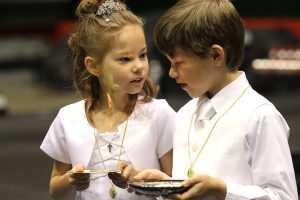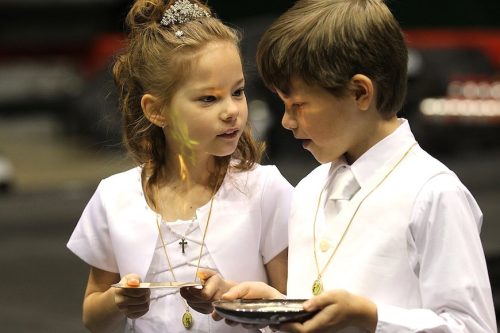
By Joseph D. White | OSV News
A child’s first Communion is an important and exciting milestone in the life of a Catholic family. As the first and most important teachers of their children, parents present their children for baptism and guide them toward Christ as they are initiated into the church community. Handing on our faith to the next generation can feel like an awesome responsibility. We may sometimes wonder if we “know enough” or are “good enough,” but God gives parents all the grace they need to raise their children to know and love him.
Here are 10 ideas for spiritual and practical preparation to help you and your child as you anticipate this important day.
Spiritual preparations
- Talk to your child about his or her baptism. All sacraments are necessarily related to baptism, the first sacrament we celebrate. Most children, having been baptized as infants, won’t remember their baptism. Take out your child’s baptismal candle and pictures and talk about the important day he or she was welcomed into the family of God. Discuss how first Communion is an extension of that day, as now they are welcomed to the family meal.
- Talk with your child about your own first Communion experience. Try to remember as much as possible about your own first Communion day and share this with your child. Encourage other family members (such as brothers and sisters) to talk about their experiences as well. Take out first Communion photos if you have them.
- Celebrate meals together as a family. Unfortunately, our society’s hectic pace has made sitting down to meals as a family less common; yet, the family meal is an important opportunity for sharing and becoming closer to one another. It’s difficult for children to understand the Eucharist as the family meal of the church if they have no experience with eating together with their families at home — the “domestic church.” If you don’t already, make it a point to eat together at the table with no television on several occasions before your child’s first Communion. It’s a practice you may decide to continue.
- Spend time in family prayer. In Pope St. John Paul II’s “Letter to Families,” the pope called prayer the source of all renewal of family life. Spend some time praying together, asking God to prepare your child to receive Jesus in the Eucharist and thanking him for this wonderful gift. You may even want to pray a first Communion novena during the days leading up to your child’s first Communion celebration.
- Help your child understand and participate in the Mass. Encourage your child to pay attention to the Mass, singing and praying the responses along with you. Special children’s missals and books about the Mass often include both the prayers of the Mass and pictures. You may also wish to practice the prayers of the Mass with your child at other times. For example, say, “The Lord be with you,” and encourage your child to respond appropriately.
- Attend Holy Thursday Mass and Eucharistic adoration as a family. The Holy Thursday liturgy, which typically precedes first Communion on the parish calendar, can be a wonderful learning experience for children preparing for Eucharist. It recalls the story of the first Eucharist, Jesus’ Last Supper with his apostles, and closes with the transfer of the Eucharist and Eucharistic adoration. Some parishes also have other times for adoration of the Blessed Sacrament. Stopping by for a short time of prayer can help children better appreciate Christ’s presence in the Eucharist.
Practical preparations
- Plan the wardrobe. Several weeks in advance, involve your child in deciding what he or she will wear on first Communion day. Spring fashions are generally in the stores by late winter, so if your child is celebrating in the spring, February or March is a good time to shop. More traditional first Communion attire may include white dresses with veils for girls and black or white suits for boys. However, at some parishes, nice Sunday clothes are the norm. The most important part of choosing what your child is to wear is to make sure his or her attire reflects the dignity and joy of the occasion.
- Invite friends and extended family members. Be sure to let friends and family members, and especially his or her godparents, know as soon as possible about your child’s first Communion celebration. You may want to enlist your child’s help in writing invitations to attend.
- Involve cultural and family traditions in your first Communion preparations. Find out if there are first Communion traditions that are specific to your family or cultural group, and involve these traditions as much as possible in your preparations for your child. This will highlight the fact that he or she is joining the family at the Eucharistic table.
- Find a meaningful gift to mark the occasion. While first Communion isn’t about getting gifts and money, it’s helpful for your child to receive something concrete to help remember this important milestone. Spiritual articles make especially good first Communion gifts.
– – –
Dr. Joseph White is a clinical psychologist who writes on catechesis, ministry and other topics, and whose books include “Listening for God in Everyday Life” (Our Sunday Visitor, 2020).






















